|
|
|
Sort Order |
|
|
|
Items / Page
|
|
|
|
|
|
|
| Srl | Item |
| 1 |
ID:
075921
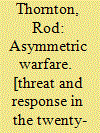

|
|
|
|
|
| Publication |
Malden, Polity Press, 2007.
|
| Description |
viii, 241p.
|
| Standard Number |
074563365X
|
|
|
|
|
|
|
|
|
|
|
|
Copies: C:1/I:0,R:0,Q:0
Circulation
| Accession# | Call# | Current Location | Status | Policy | Location |
| 052180 | 327.17/THO 052180 | Main | On Shelf | General | |
|
|
|
|
| 2 |
ID:
084874
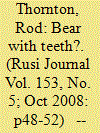

|
|
|
| 3 |
ID:
051998
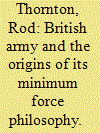

|
|
|
| 4 |
ID:
140949
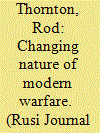

|
|
|
|
|
| Summary/Abstract |
While Western militaries recognise the logic and necessity of ‘irregular warfare’ in their military operations, the manifold aspects of irregular fighting have yet to be mastered fully. Information warfare, for example, appears to be a tool more capably employed by Russia, to the detriment of NATO. Rod Thornton explains how and why Russia has ‘won’ in Crimea by affording subversive information campaigns primacy in its military operations. Acknowledging the twofold constraints of international law and co-ordination that face Western governments seeking to play the same game, Thornton nonetheless expounds how the West might better pursue asymmetry in the security realm.
|
|
|
|
|
|
|
|
|
|
|
|
|
|
|
|
| 5 |
ID:
076968
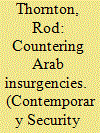

|
|
|
| 6 |
ID:
164265


|
|
|
|
|
| Summary/Abstract |
This article examines the Russian military involvement on land in Syria and in the Eastern Mediterranean Sea. It considers, in particular, why the point is constantly being made in Russian political and military circles that these two commitments will be ‘permanent’ in nature. It begins by providing the rationales for the initial establishment of a Russian Eastern Mediterranean naval flotilla and the later sending of ground troops with air support to Syria. It goes on to show what benefits — geopolitical, political, military, and, in particular, strategic — have accrued to Russia from the combination of these two missions. The article concludes by showing that these benefits are too substantial for any Russian political leader to contemplate a withdrawal from Syria at any point in the foreseeable future.
|
|
|
|
|
|
|
|
|
|
|
|
|
|
|
|
| 7 |
ID:
081911
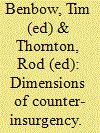

|
|
|
|
|
| Publication |
London, Routledge, 2008.
|
| Description |
xviii, 222p.
|
| Standard Number |
9780415450379
|
|
|
|
|
|
|
|
|
|
|
|
Copies: C:1/I:0,R:0,Q:0
Circulation
| Accession# | Call# | Current Location | Status | Policy | Location |
| 053547 | 355.0218/BEN 053547 | Main | On Shelf | General | |
|
|
|
|
| 8 |
ID:
076551
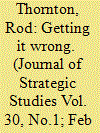

|
|
|
|
|
| Publication |
2007.
|
| Summary/Abstract |
This article considers the way in which a military force committed to a 'stabilization' operation can, through its own mistakes, actually make that mission much more difficult than it need be. The British Army was committed to a peace support task in Northern Ireland in 1969 but the errors made by those within its ranks went a long way in moving that task away from one of peace support to one of countering a fully fledged insurgency. Through an examination of the clumsiness displayed by the British Army in Northern Ireland in its initial period of deployment (August 1969 - March 1972) several parallels can be drawn with events recently in Iraq. What is more, fundamental lessons can be learnt from the British experience. These lessons still have relevance today as the West continues to commit forces to interventionary operations; forces which are making the same mistakes the British Army did nearly 40 years ago.
|
|
|
|
|
|
|
|
|
|
|
|
|
|
|
|
| 9 |
ID:
114282
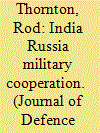

|
|
|
|
|
| Publication |
2012.
|
| Summary/Abstract |
This article considers the relationship-in defence terms-between India and Russia. It looks at the level of military cooperation and the nexus the two countries have created in regard to arms transfers and their joint research into, and production of, weapons systems. This relationship is, of course, one that is constantly evolving as different strategic and political pressures come to bear. The analysis here concentrates on the current standing of the defence links between Delhi and Moscow. Evidence is presented to show that, at the moment, Russia is keen for both political and economic reasons to see the relationship continue to grow. India, for its part, is not quite so enthusiastic. But this is, as this article argues, a relationship that does seem to offer significant advantages to both sides. It has come under strain, yes, but it makes perfect sense for it not only to continue, but also to actually strengthen.
|
|
|
|
|
|
|
|
|
|
|
|
|
|
|
|
| 10 |
ID:
054231
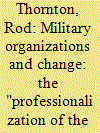

|
|
|
|
|
| Publication |
Jul-Sep 2004.
|
|
|
|
|
|
|
|
|
|
|
|
|
|
|
|
| 11 |
ID:
146208
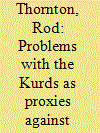

|
|
|
|
|
| Summary/Abstract |
The siege of the northern Syrian town of Kobane was lifted in January 2015. The Kurdish defenders there had triumphed against Islamic State (IS). The conflict then moved on. It moved on, though, with the United States, the United Kingdom, and other Western powers having adopted, almost by default, the Kurds as proxy fighters in this conflict. The Kurds, however, are a divided and fractious nation spread across three states and historically famous for fighting among themselves. In employing the Kurds as proxies against IS, as this article shows, these Western powers must be aware of the unintended consequences that can result.
|
|
|
|
|
|
|
|
|
|
|
|
|
|
|
|
| 12 |
ID:
163041
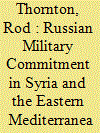

|
|
|
|
|
| Summary/Abstract |
Western powers are normally keen to stress that their overseas military interventions will be distinctly finite. Russia’s President Vladimir Putin, however, is doing no such thing in relation to Syria. As Rod Thornton shows, he has made it clear that the commitment of Russian forces to the Eastern Mediterranean region is very much for the long haul.
|
|
|
|
|
|
|
|
|
|
|
|
|
|
|
|
| 13 |
ID:
155710
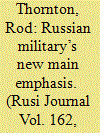

|
|
|
|
|
| Summary/Abstract |
The nature of the Russian military threat to Western interests needs to be reassessed. An examination of articles in Russian military journals shows that its senior ranks now see ‘asymmetric means and methods’ as their new ‘main emphasis’ in modern peer-state wars. Rod Thornton explains that for them, winning such wars through asymmetric means has become a key way to impose Moscow’s will on other states. Remarkably, they seek to avoid the use of military violence.
|
|
|
|
|
|
|
|
|
|
|
|
|
|
|
|
| 14 |
ID:
147808
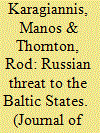

|
|
|
|
|
| Summary/Abstract |
This article examines the responses made by the Baltic States to the threat they face from Russian hybrid warfare. It looks first at the nature of this threat and at the many modes of warfare that are being employed by Russia, including, and in particular, information warfare. The article then goes on to examine the way in which this threat is viewed in the Baltic States and the debate over how it can best be countered. Raising defenses, though, as is made clear here, is not easy. Indeed, this article argues that the defenses that are being raised by the Baltic States will prove largely ineffective and possibly counterproductive.
|
|
|
|
|
|
|
|
|
|
|
|
|
|
|
|
| 15 |
ID:
123225
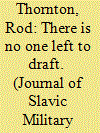

|
|
|
|
|
| Publication |
2013.
|
| Summary/Abstract |
Since the end of the Cold War, a succession of Russian government leaders has tried to abolish conscription. But ending Russia's conscript military and replacing it with one manned by professionals has not proven to be an easy task. In fact, it has proven impossible. It appears now, and especially after the recent removal of Defense Minister Anatoliy Serdyukov, that conscription will remain for the foreseeable future. Moreover, the attempts that the politicians have made to end conscription have left, in particular, the Russian army marooned between two manning schema: not quite professional and not quite conscript. This current arrangement is both strategically unsound and politically unsustainable.
|
|
|
|
|
|
|
|
|
|
|
|
|
|
|
|
| 16 |
ID:
174496
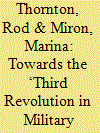

|
|
|
|
|
| Summary/Abstract |
There is an ongoing international arms race in the field of artificial intelligence (AI). But whereas military organisations in the West are viewing AI principally as an enabler in the tactical realm, this is not the case in Russia. The Russian military sees AI’s greatest utility at the strategic level. Its emphasis is on employing AI-enhanced information warfare tools (including in cyber warfare) to produce truly game-changing strategic effects against state adversaries. AI’s use in this capacity heralds a ‘third revolution in military affairs’. Rod Thornton and Marina Miron examine its profound implications for the future of warfare
|
|
|
|
|
|
|
|
|
|
|
|
|
|
|
|
| 17 |
ID:
051865
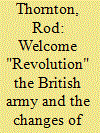

|
|
|
|
|
|
|
|